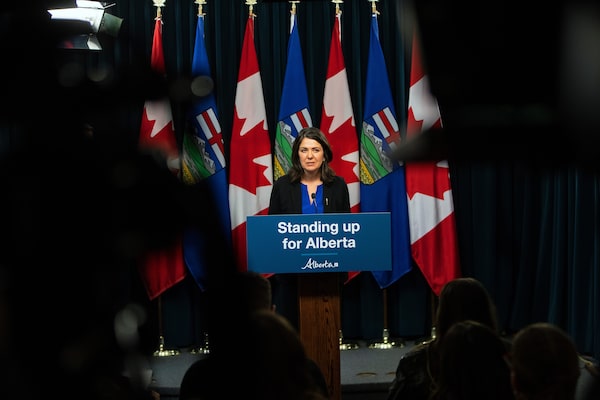
Alberta Premier Danielle Smith speaks after the speech from the throne in Edmonton on Nov. 29.JASON FRANSON/The Canadian Press
Alberta Premier Danielle Smith has shifted the rationale for introducing a sovereignty act, declaring that the purpose of her signature legislation is to ensure that any action taken to oppose Ottawa would first have the approval of the legislature.
Ms. Smith characterized the proposed amendments introduced earlier this week as changes that would give the legislature “power to direct cabinet, which is actually kind of a reversal of how law-making normally works.”
But when the Premier tabled the bill in the legislature a week ago, the proposed legislation would have given cabinet unchecked powers to rewrite provincial laws without the need for a vote in the assembly.
Ms. Smith has argued that the bill is necessary in order to fight back against what she views as federal intrusion on provincial jurisdiction. The concept was widely panned as unconstitutional. By Monday, members of the United Conservative Party caucus, many of whom months ago disagreed with the premise of the sovereignty act, voted to put forward amendments.
Cryderman: Danielle Smith’s sovereignty act faces unexpected in-house criticism
The proposed amendments would neuter the section that would grant cabinet new law-making powers. Cabinet, under the draft amendments, could still change regulations, mirroring existing powers available to the Premier and her ministers.
Ms. Smith, when asked about the legislation’s purpose given the proposed amendments, said the bill is about empowering the assembly.
“The point of the sovereignty act is to get legislative approval to make sure that we take every action we can to assert our rights against the federal government,” Ms. Smith told reporters Tuesday.
“If we’re going to take action to change regulations or issue directives or make policy changes or do ministerial orders, we want to get the preapproval from the elected members of the legislature.”
Under the proposed sovereignty act, Alberta legislators would decide whether Ottawa’s actions – or possible actions – tread on the province’s jurisdiction. Alberta would then push back by refusing to implement the federal policy.
Lisa Young, political science professor at the University of Calgary, said the draft amendments appear to render most of the act redundant. Alberta, she noted, does not need to a sovereignty act to change regulations. The act proposes giving cabinet power to direct provincial entities, such as universities, cities, police and school boards, to ignore federal policies. But it does not outline the consequences of disregarding such orders. Further, government already has levers it can pull to influence such entities.
“The deeper we get into this, the less coherent the Premier’s explanations of what she’s doing and why she’s doing it become,” Ms. Young said.
While Ms. Young questioned Ms. Smith’s assertion that the act gives Alberta a new shield to use against an invading Ottawa, the professor said it gives the Premier a powerful weapon to use against the provincial New Democratic Party.
“The one thing that it still does is it gives her the best plausible chance at portraying Rachel Notley as being in league with Justin Trudeau.”
The NDP opposed the sovereignty act on first reading and said its members will not support amendments. In the legislature Tuesday, Ms. Notley, the NDP Leader, called on the Premier to withdraw the bill. Ms. Young expects the UCP to use the NDP’s opposition to the bill, and any forthcoming votes against invoking it come spring, as fodder in the general election, scheduled for May, 2023.
Saskatchewan in early November introduced a similar bill, although that legislation will create a tribunal that would define, quantify and report on the economic repercussions of federal policies in the province. Under Alberta’s sovereignty strategy, MLAs will rule on whether Ottawa has crossed jurisdictional boundaries. This facet of the legislation triggered debate over whether it is constitutional.
Indigenous leaders in both provinces have spoken out against the bills. On Wednesday, at the Assembly of First Nations Special Chiefs Assembly in Ottawa, a trio of chiefs from Western Canada will ask their counterparts from across the country to support them in rejecting provincial sovereignty acts.
Vice-chief Aly Bear of the Federation of Sovereign Indigenous Nations in Saskatchewan; chief Tony Alexis, on behalf of Treaty Six in Alberta and Saskatchewan; and chief Darcy Dixon, representing four nations in Treaty Seven, plan to discuss an emergency resolution at the meeting.
AFN national chief RoseAnne Archibald will also issue a statement alongside the three chiefs, according to a statement the group issued Tuesday afternoon.
 Carrie Tait
Carrie Tait